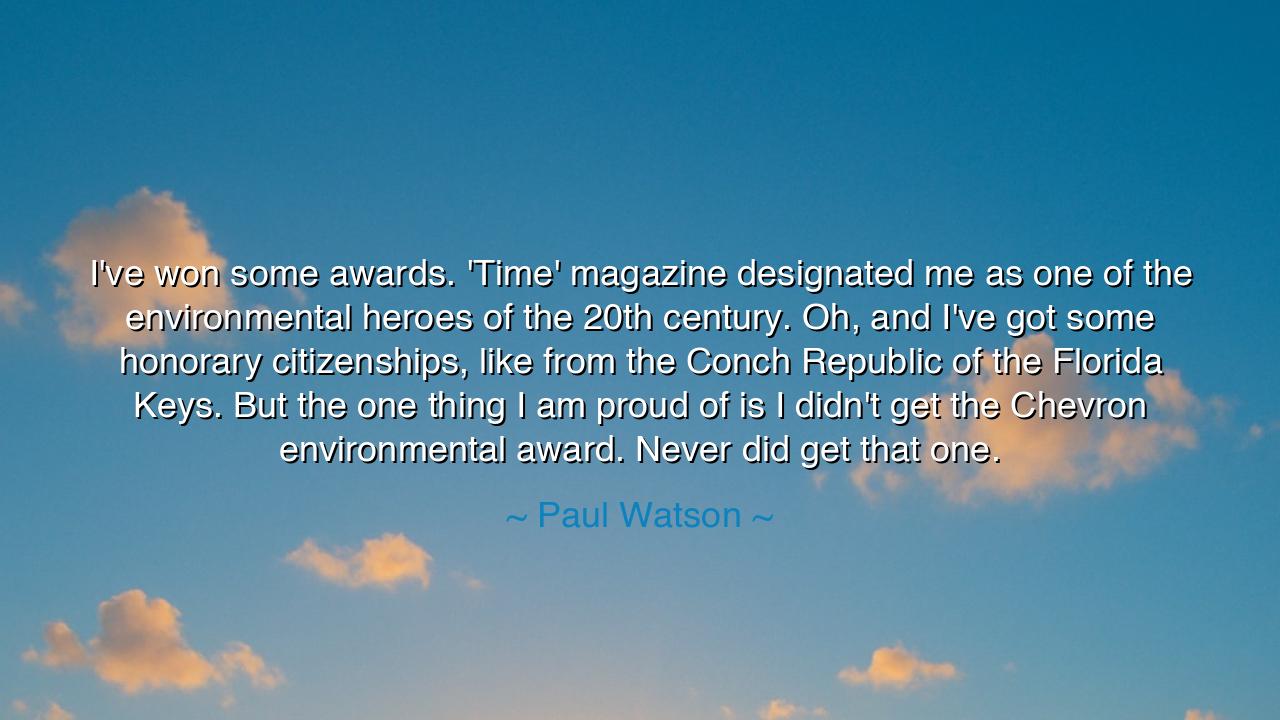
I've won some awards. 'Time' magazine designated me as one of the
I've won some awards. 'Time' magazine designated me as one of the environmental heroes of the 20th century. Oh, and I've got some honorary citizenships, like from the Conch Republic of the Florida Keys. But the one thing I am proud of is I didn't get the Chevron environmental award. Never did get that one.






Hear, O listeners, the bold and fiery words of Paul Watson, who declared: “I’ve won some awards. ‘Time’ magazine designated me as one of the environmental heroes of the 20th century. Oh, and I’ve got some honorary citizenships, like from the Conch Republic of the Florida Keys. But the one thing I am proud of is I didn’t get the Chevron environmental award. Never did get that one.” In this statement, half in jest yet heavy with meaning, lies a profound truth: not all honors are equal, and not all recognition is worth receiving.
The meaning of Watson’s words lies in the contrast between true honor and false honor. To be named an environmental hero by independent voices, to be cherished by communities that love the sea and the land—that is recognition born of genuine sacrifice and struggle. But to accept an award from a corporation whose hands are stained by pollution, whose name is linked with oil spills and the scarring of ecosystems—such an honor would not be a crown but a chain, binding the recipient to hypocrisy. Watson proclaims with pride that he has never been so compromised, that his record of resistance remains untarnished.
The ancients understood this distinction well. They spoke of the difference between glory and corruption, between crowns offered by the people and gifts bestowed by tyrants. In Greece, the victors of the Olympic Games received wreaths of olive leaves, symbols of purity and peace, while flatterers of kings were laden with gold but despised by history. In the same way, Watson teaches that the value of an award is measured not by its shine, but by the hands that bestow it.
History offers us clear examples. Consider the case of Rachel Carson, whose book Silent Spring exposed the dangers of pesticides. She was scorned by chemical companies, denied their awards, attacked by their spokesmen. Yet today, she is remembered as a guardian of nature, while those who opposed her are forgotten. On the other hand, some who accepted corporate honors found their reputations diminished, remembered not as defenders of truth but as pawns of power. Watson places himself firmly in Carson’s company, refusing to seek legitimacy from those whose actions betray the very cause of the environment.
His words also strike at the heart of a greater warning: beware the seduction of greenwashing, when companies that harm the earth cloak themselves in the language of sustainability, offering prizes and sponsorships to silence criticism and polish their image. To accept such an award may seem flattering, but it risks aligning one’s name with those who poison rivers, blacken skies, and devastate oceans. Watson’s rejection of the Chevron environmental award is thus a badge of integrity, a declaration that he will not be bought, not even in appearance.
The lesson for us is powerful. Do not measure your worth by the honors the world offers, for some honors corrupt the soul. Seek instead the recognition that springs from truth, from the gratitude of communities, from the testimony of conscience. Better to be despised by the powerful and remembered as righteous than to be praised by those who destroy and remembered as their servant. In life, as in history, the greatest crowns are often invisible: the peace of knowing you stood firm when others wavered.
Therefore, O listener, live with discernment. When recognition comes, ask: who gives it, and why? Accept only that which aligns with your values, and reject the rest with courage. Let your pride be in your faithfulness, not in the applause of those who betray the earth. And know this: in refusing false honors, you preserve the only award that matters—the legacy of truth, passed down to future generations.
So let Watson’s words endure as both jest and judgment: to never receive the Chevron environmental award was his true badge of honor. May we, too, learn to distinguish between the glitter of compromise and the quiet, enduring light of integrity. For in that light lies the true reward of a life lived faithfully.






AAdministratorAdministrator
Welcome, honored guests. Please leave a comment, we will respond soon